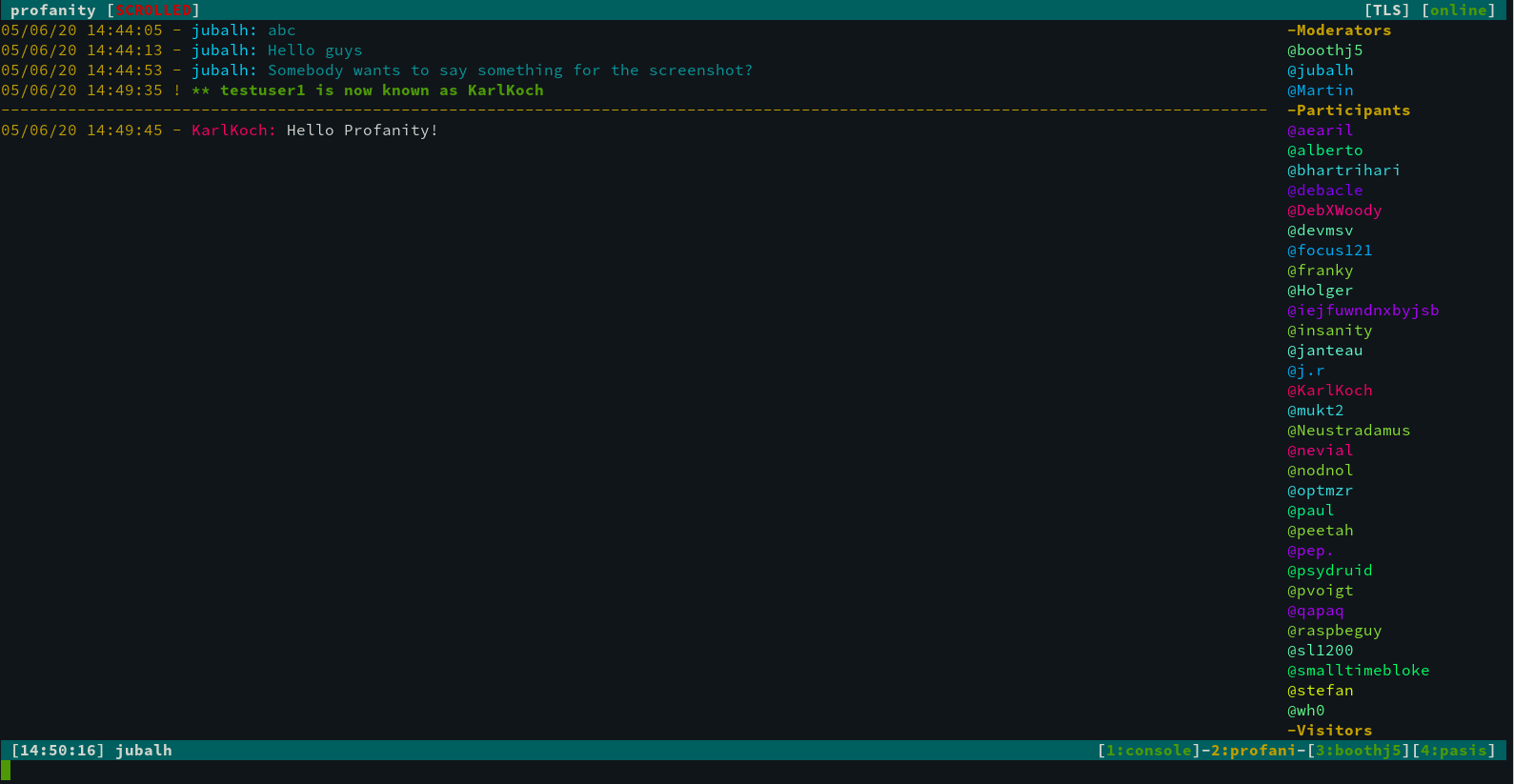Profanity is a console based XMPP client using ncurses and libstrophe, inspired by Irssi.
Profanity only supports one account per instance. But you certainly can run several instances of Profanity.
The user interface is split into four main areas: Title bar, main window area, status bar, and input bar.
Profanity is free and open source software.
Features include:
- Supports encrpytion – OTR, PGP, and OMEMO.
- Supports XMPP chat services.
- Roster management.
- Flexible resource and priority settings.
- Provides an API for plugins to access various functionality. Plugins may also implement ‘hooks’ that Profanity will call on specific events.
- Supports plugins written in Python and C. Examples include:
- ascii.py – convert text to ascii art text and send to the current recipient or room.
- browser.py – open received links in the system default browser.
- clients.py – show client software used by each occupant in the current chat room, using xep-0092 Software Version.
- imgur.py – send a local image file or a screenshot to a recipient or chat room using imgur.com.
- paste.py – send the contents of the clipboard to the current recipient or room.
- termuxnotify.py – notifications for Termux on Android.
- presence_notify.py – configure desktop notifications for presence updates from contacts.
- say.py – read out loud messages from recipients or in chat rooms.
- sounds.py – play sounds when messages received.
- syscmd.py – display the result shell commands in a new window. Send results of shell commands to recipients or chat rooms.
- wikipedia-prof.py – search wikipedia and show search results, pages, links etc in a new window.
- Cross-platform support – runs under Linux, FreeBSD, OpenBSD, Android, Mac OS X, and Windows.
Website: profanity-im.github.io
Support: User Guide, FAQ, GitHub Code Repository
Developer: James Booth
License: GNU General Public License, either version 3 of the License, or (at your option) any later version.

Profanity is written in C. Learn C with our recommended free books and free tutorials.
Return to Console-Based XMPP Clients
| Popular series | |
|---|---|
| The largest compilation of the best free and open source software in the universe. Each article is supplied with a legendary ratings chart helping you to make informed decisions. | |
| Hundreds of in-depth reviews offering our unbiased and expert opinion on software. We offer helpful and impartial information. | |
| The Big List of Active Linux Distros is a large compilation of actively developed Linux distributions. | |
| Replace proprietary software with open source alternatives: Google, Microsoft, Apple, Adobe, IBM, Autodesk, Oracle, Atlassian, Corel, Cisco, Intuit, SAS, Progress, Salesforce, and Citrix | |
| Awesome Free Linux Games Tools showcases a series of tools that making gaming on Linux a more pleasurable experience. This is a new series. | |
| Machine Learning explores practical applications of machine learning and deep learning from a Linux perspective. We've written reviews of more than 40 self-hosted apps. All are free and open source. | |
| New to Linux? Read our Linux for Starters series. We start right at the basics and teach you everything you need to know to get started with Linux. | |
| Alternatives to popular CLI tools showcases essential tools that are modern replacements for core Linux utilities. | |
| Essential Linux system tools focuses on small, indispensable utilities, useful for system administrators as well as regular users. | |
| Linux utilities to maximise your productivity. Small, indispensable tools, useful for anyone running a Linux machine. | |
| Surveys popular streaming services from a Linux perspective: Amazon Music Unlimited, Myuzi, Spotify, Deezer, Tidal. | |
| Saving Money with Linux looks at how you can reduce your energy bills running Linux. | |
| Home computers became commonplace in the 1980s. Emulate home computers including the Commodore 64, Amiga, Atari ST, ZX81, Amstrad CPC, and ZX Spectrum. | |
| Now and Then examines how promising open source software fared over the years. It can be a bumpy ride. | |
| Linux at Home looks at a range of home activities where Linux can play its part, making the most of our time at home, keeping active and engaged. | |
| Linux Candy reveals the lighter side of Linux. Have some fun and escape from the daily drudgery. | |
| Getting Started with Docker helps you master Docker, a set of platform as a service products that delivers software in packages called containers. | |
| Best Free Android Apps. We showcase free Android apps that are definitely worth downloading. There's a strict eligibility criteria for inclusion in this series. | |
| These best free books accelerate your learning of every programming language. Learn a new language today! | |
| These free tutorials offer the perfect tonic to our free programming books series. | |
| Linux Around The World showcases usergroups that are relevant to Linux enthusiasts. Great ways to meet up with fellow enthusiasts. | |
| Stars and Stripes is an occasional series looking at the impact of Linux in the USA. | |
